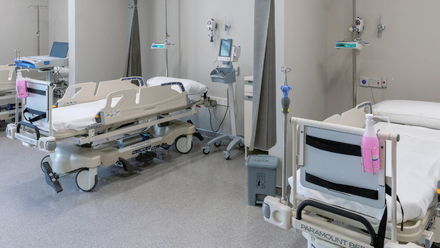Our Response to the Government's COVID-19 Plan B
The Intensive Care Society urges the Government to act decisively and to act now.
The Intensive Care Society was surprised to hear the Government saying in its last briefing [20.10.21] that “the NHS is not under unsustainable pressure”.
The strain on the intensive care community as a result of the pandemic is still very much present, and our members are seeing and telling a very different story, especially as patient numbers continue to rise at alarming rates.
At the beginning of the pandemic, the Government made it clear that we must protect the NHS. Now, almost two years on, this principle still applies. The Government must take notice of the rising numbers of COVID cases, hospital admissions and deaths, and must act now to prevent the NHS becoming overwhelmed.
Over 52,000 daily COVID cases were reported yesterday [21.10.21], making it the fourth day in a row that the UK has reported over 40,000 cases. The Secretary of State for Health, Sajid Javid, has also warned that cases could reach over 100,000 per day. The number of cases in the UK is far higher than our European neighbours. Yet, in Wednesday’s briefing the Government stated that the evolving crisis has still not met the threshold to warrant further restrictions through 'Plan B'.
We cannot emphasise enough how effective the vaccine rollout has been in preventing serious illness, relieving impact on hospitals, and saving lives. Even with all of this, we are still seeing immense pressures on the NHS. We are encouraging all those who are yet (and eligible) to be vaccinated, to do so as quickly as possible.
Right now, more than one in five intensive care beds are occupied by a patient with COVID. Each of these patients will stay, on average, at least one week in ICU, and for those who survive, the stay is much longer than other patients in intensive care. This significantly reduces the capacity of ICUs to care for patients without COVID who need lifesaving care. Everyday ICU staff are trying desperately to squeeze thousands of patients without COVID into less than 80% of available ICU capacity.
We know that every year winter places the NHS under pressure, but winter 2021 will be different. COVID is on the rise again - a combination of waning vaccine effectiveness and increased viral transmission could be responsible. The NHS is having to cope not only with another surge of patients with COVID, but the backlog of millions who need urgent life-saving surgery, and the expected increase in patients with non-COVID illnesses like influenza as well. This situation is going to worsen as we get further into winter.
Trying to manage all the different variables and areas across the hospital; COVID vs non-COVID, is also causing additional pressures outside of intensive care among our primary care, acute and emergency colleagues. There is also a rise of children with Respiratory Syncytial Virus (RSV) being admitted into Paediatric intensive care.
For the past 20 months, the intensive care community and the wider NHS have faced unrelenting pressure responding to the COVID pandemic. As a result, intensive care staff have faced stress and burnout, as well as physical and mental illness. Sadly, some staff have chosen to leave the profession altogether.
In light of the evolving COVID situation, and at the request of our community, the Intensive Care Society has re-convened its National Emergency Critical Care Committee. This brings together representatives from healthcare, the NHS, and other medical colleges and societies across the country to create a unified approach to managing COVID.
We are urging the Government to look to the numbers and draw on the lessons from the past two years. The vaccine booster rollout must be accelerated. Additional restrictions to reduce viral transmission are urgently needed.
We also urge the public to wear a mask in crowded spaces and again, to get vaccinated against COVID and flu, this winter.
Hands, Face, Space, Fresh Air.
Failing to act now will seriously impact the NHS and all our lives



